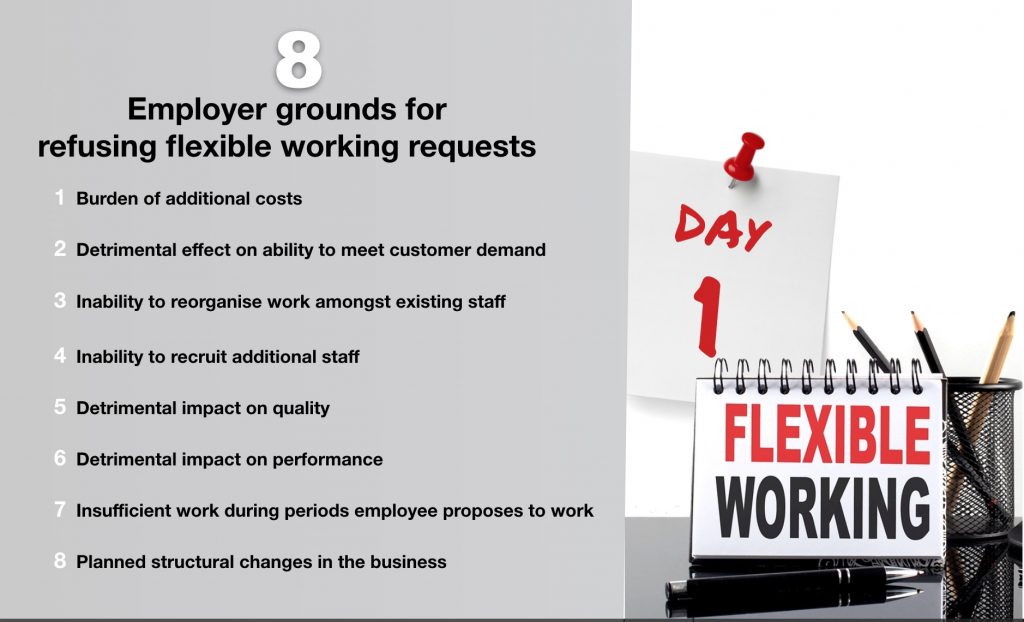Estimated reading time: 10 minutes
From 6th April 2024, all employees have the right to request flexible working from Day 1 in their role, removing the previous 26 week wait. The Flexible Working (Amendment) Regulations 2023 represent a major shift in the approach to flexible working in the UK, reflecting changing attitudes towards balancing the demands of work with personal life and caring responsibilities.
Alongside this, there are changes to the procedure for requesting flexible working, which were also brought into force on 6th April.
The new right and procedure is supported by an updated Statutory Acas Code of Practice on requests for flexible working which also came into force on 6th April 2024.
Failing to adhere to this new procedure can lead to employment tribunal (ET) claims, with compensation of up to eight weeks’ pay (capped at £643 per week) and an order by the ET to rerun the process, alongside potential for Acas Arbitration Scheme referral, when Acas will decide the dispute.
If a case ends up in the ET and you haven’t followed the ACAS Code of Practice on flexible working, you can be liable to a 25% uplift in the amount of any award.
This article explains the key changes to the procedure, how to respond to requests, strategies for minimising the risks associated with refusing requests and avoiding potential discrimination claims.
Summary: New rules for handling flexible working requests
If an employee makes a statutory flexible working request, as an employer you must:
- handle it in a reasonable way, in line with the Acas Statutory Code of Practice on requests for flexible working
- accept the request unless there’s a genuine business reason not to
- consult with the employee, and if not agreeing to the request in full, discuss any alternative options
- make a decision within a maximum of 2 months
- not dismiss or cause your employee detriment because of the request
What is flexible working?
Flexible working is a broad term that covers :
when employees work, their working hours or patterns such as part-time, term-time, flexi-time (which allows for flexible start and finish times beyond ‘core hours’ or gives time off in lieu of extra working hours), compressed hours (e.g working a 5 day week in 4 days) and annualised hours .
where employees work, such as home working and hybrid working,
how jobs are performed, such as job-sharing.
Employees may ask for any of these when applying to change their working arrangements.
Making a flexible working request:
An employee can make a flexible working request for any reason.
The employee’s application must:
- Be in writing and dated
- Clearly indicate that it’s an application under the statutory right to request
- Specify the desired change and propose a date for the change to become effective
- State if the employee has previously made a request and, if yes, when it was made.
This has simplified the application process and means employees no longer need to justify how their request impacts the business, shifting the onus onto employers to think about the effects. You need to make clear to your employees (in your flexible working policy) that the above information must be included in any statutory request for flexible working.
An employee can make 2 statutory requests for flexible working within any 12 month period, rather than 1 request per year as was previously the case. If an employee has already submitted 2 applications, they cannot submit another to their employer within a year, though they can still make informal requests. Additionally, an employee cannot make a new application while one is still pending.
Responding to a flexible working request:
Timely handling and Consultation
- Timely Handling: Employers have 2 months (reduced from 3) to respond to a request, unless both parties agree to extend the time. Mutually agreeing to extend the time period may be particularly useful when further information is needed (for example where the employer is looking to make reasonable adjustments if the flexible working request is to accommodate a health related issue or disability) or where a trial period has been agreed.
- Consultation: Employers must allow reasonable consultation and consideration of a request before rejecting it. This would usually be done at a meeting. The Acas Code of Practice suggests discussions should include the potential benefits and impacts of the change for both the employer and employee.
Meetings and Decisions
- Meeting Requirement: Unless the request is immediately accepted in full, the employer should arrange a meeting swiftly with the employee to discuss the request and explore alternatives. The employer should keep a written record of the meeting reflecting an accurate record of the discussion.
- Decision Making: Employers must agree to the request unless there is a genuine business reason not to. There are 8 statutory grounds on which an employer can reasonably refuse a request for flexible working. Employers must convey their decision in writing. A refusal letter must specify clearly the genuine business reason for refusing the request.
Consider running a trial period of the proposed flexible working arrangements. This will provide tangible evidence of whether or not the arrangements work in practice.
Refusing a flexible working request: 8 statutory grounds
An employer can reject a flexible working application only if there’s a genuine business reason for doing so. You must assess whether any of the following 8 statutory grounds applies:

In rejecting an application, employers can’t just assert that one of these statutory grounds for refusal exists. Instead, you should provide the employee with a clear explanation of which ground applies and why it led to their application being rejected.
Flow chart: the procedure on statutory requests for flexible working
Download this flow chart which summarises the suggested procedure for dealing with a statutory request.
A principal aim of the legislation is to make sure employers seriously consider flexible working requests. It is intended to curb blanket refusals and to foster dialogue about possible compromises. Employers are not required to follow a specific procedure but must deal with requests in a “reasonable manner”. There is no statutory definition of what constitutes “reasonable”, but both the revised Acas Code of Practice and guidance make recommendations.
For example, where an employer is unable to approve a request, the Acas Code suggests the employer and employee discuss alternative options, or a modified version of the request that might work instead. Employers are expected to suggest compromises where possible rather than outright dismissing a request.
While there is no legal obligation on employers to offer an appeal meeting, or to allow an employee to bring a companion to any meeting about a flexible working request, the Acas Code suggests it is good practice to allow an appeal and to allow employees to be accompanied at all meetings. Doing so serves as evidence that the employer was acting reasonably.
Trial Periods
If you aren’t sure whether a flexible working request will work, and equally if you’re sure it won’t work, consider trying it out with the employee for a set time, called a trial period. Agree and set an end date, and specify that their working arrangements revert to the original terms at the end of the trial, to avoid inadvertently creating a permanent contractual change. To do this, you may need to extend the two-month deadline for a decision, by agreement with the employee.
It’s important to say clearly that it’s just a trial. You will also need to agree with the employee when to review the new plan and set clear criteria to decide if it’s been successful.
Avoiding discrimination
Employers handling flexible working requests must be vigilant about the risk of potential claims under the Equality Act 2010 which may arise from protected characteristics like disability, sex, race, or age.
In some situations, a request for a flexible working arrangement could in fact be a ‘reasonable adjustment’ relating to a disability. For example, an employee with diabetes who is finding his workload and hours stressful, and has been told by his doctor that he needs more rest, might make a flexible working request to work fewer days. By refusing the request, the employer will be in breach of its duty under the Equality Act 2010 to make reasonable adjustments for this particular employee. Refusing this request would amount to disability discrimination and may lead to an uncapped claim. The 8 business reasons for turning down a flexible working request do not apply here. The employer may need to obtain medical advice on the reasonable adjustments that should be made for the employee. This could make it difficult to comply with the 2 month time limit for dealing with the flexible working request. It’s important to identify this early and agree on an extension of the time limit with the employee.
Its the employer’s responsibility to spot requests for reasonable adjustments relating to a disability which might come disguised as requests for flexible working. Having a proper discussion and open consultation will help ensure this.
Likewise, when handling flexible working requests for caring responsibilities, be aware of the potential for indirect sex discrimination. For example a mother requesting flexible working for childcare reasons could be a protected characteristic and so to refuse could be discrimination. This could also apply to a male employee in the same position who makes a flexible working request for caring reasons. If he can show that female employees are disadvantaged and he suffers the same disadvantage. Remember ‘caring responsibilities’ can encompass elderly/relative care as well as childcare
A refusal letter must specify the clear business reason or reasons for refusing the request, and not the person’s situation. For example, if you refuse an employee’s request to return to work part time following maternity leave, saying “the employee will be too remote from the business” or “the team has to be full time” the reason given is more about the person’s situation and does not specify a business reason within one of the 8 statutory grounds this then leaves your organisation vulnerable to a discrimination claim.
It may be prudent when deciding whether to accept or reject a flexible working request to state that the decision is provisional and subject to appeal by the employee. This gives you, as the employer, a chance to remedy any defects in the process followed or to have a trial period and gain evidence of how the arrangements do actually work in practice.
Implications and Practical tips for employers
Employers will have to consider how they will prioritise requests. There will be competing demands for flexible working relating to childcare, care for elderly parents, recovery from illness, disability and reasonable adjustments, pregnancy and maternity and so on.
It will mean dealing with successive requests, very careful decisions on ranking requests in order of preference, keeping records of the timing of the requests and the discussions as well as the decisions made, responding more quickly and engaging more effectively with requests.
The right to request flexible working from Day 1 is a major change to UK working practices. It’s hugely popular with employees, working families and those with caring responsibilities, why would it be otherwise? But it will take some nips and tucks, and effective recruitment (for 1 and 2 day roles), from Employers, HRs and Line Managers, not least to ensure those who are working full time aren’t picking up the additional work. The direction of travel here is clear, and the next step is including the flexible working potential when advertising a vacancy. Going forward, Employers will need to start assessing each role and as a matter of course, ask the question, can it be done flexibly?
Remember to only to turn down a request using one of the 8 statutory reasons and if refusing a request be mindful of the discrimination risks. Also make sure staff handbooks and HR policies dealing with flexible working requests are updated to reflect the new process. If you need advice and assistance, please do get in touch.






